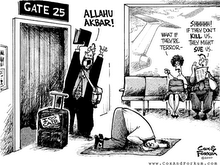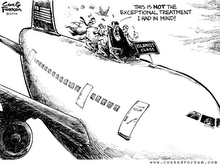Five years into President Bush's declaration of the ''global war on terrorism,'' the latest State Department report shows a 25 percent increase in worldwide terrorist attacks over the previous year. Terrorism is an abominable tactics, not an ideology. Thus declaring ''war'' against it, while politically expeditious, is in reality temerarious, as it only attacks the symptom without addressing the cause.
Global patterns show that terrorism is not exclusive to any one group. Between 1980 and 2003, the world's leader in suicide terrorism has been the Liberation Tigers of Tamil Eelam, a group that recruits from the predominantly Hindu Tamil population in Sri Lanka. According the Terrorism Knowledge Base (tkb.org), between 1968 and 2007, the largest purveyors of terrorism have been groups affiliated with communist/socialist or nationalist/separatist ideology.
Despite this, Islam continues to be conflated with terrorism.
The intertwining of political rhetoric with religious imagery by groups like al Qaeda certainly precipitates the notion of some intrinsic link between Islam and terrorism.
Historic links
This perception is greatly assisted by a veritable cottage industry of neo-experts pontificating with great certainty about the cause-effect relationship between Islam and terrorism. Such mischaracterization is at odds with the reality that Islam unequivocally condemns terrorism and advocates the preservation of life, honor and dignity of all human life as a supreme endeavor. Thus, terrorism even when carried out in the name or defense of Islam cannot be called jihad but is rather an unholy war. Robert Pape in his seminal work Dying to Win contends that military occupation, not religious ideology, is the primary enabler of terrorism.
Douglas Streusand and Harry Tunnell of the National Defense University in a recent paper argue that characterizing terrorism committed by Muslims as ''Islamic'' alienates billions of peace loving Muslims worldwide. Using terms like jihadist to describe terrorist misrepresent legitimate Islamic concepts of jihad, which to most Muslims mean striving for good. Calling terrorists jihadists also legitimizes an un-Islamic activity in the eyes of the disenfranchised Muslims, thus aiding recruitment. Developing an alternative vocabulary is a necessary but not sufficient step towards addressing the problem of terrorism.
The State Department report cites continued instability in Iraq as one of the major reasons for the increases in terrorist acts. Terrorism is indeed a consequence of wars of choice such as Iraq, but it also has historic links to other wars of necessity such as the Cold War.
During the Cold War, U.S. financing, recruitment and arming of foreign fighters to fight the Soviets in Afghanistan led not only to Soviet retreat but also its demise. However, the enabling of a culture of drugs to finance the war and the deliberate injection of religious rhetoric to motivate recruits had unintended consequences. Compounding the problem, unlike post World War II Europe, no Marshall Plan was enacted to rebuild Afghanistan where out of a population of roughly 15 million, a million Afghans had died, an additional 1 ½ million were maimed, and five million had become refugees. Amid this death and destruction, with a country littered in drugs and guns, violence became law enabling terrorists to carve out safe havens.
Common-sense methods
Failed states, like occupations, can also breed and incubate terrorism.
To contain terrorism, if not eliminate it, the way forward is to engage in common-sense methods of intelligence gathering without criminalizing entire groups of people, military strategies without resorting to indiscriminate bombings and enabling the emergence of democratic and civic societies by eliminating foreign occupations. Addressing grievances cannot automatically be dismissed as appeasement. Britain succeeded in disarming the IRA by engaging them, not ignoring its demands. In fact, the conversion of terrorist groups into peaceful political movements has often occurred when their rationale for violence ceased to exist.
In a recent Washington Post article, Zbigniew Brzezinski, national security advisor to President Jimmy Carter, called upon moderates, including Muslims, to from a global alliance ''to terminate the political conflicts that spawn terrorism.'' This alliance is only possible when American foreign policy changes course to reflect America's values of liberty and justice for all, with an unwavering commitment to dialogue and diplomacy.
Parvez Ahmed is chairman of the Council on American-Islamic Relations.









No comments:
Post a Comment